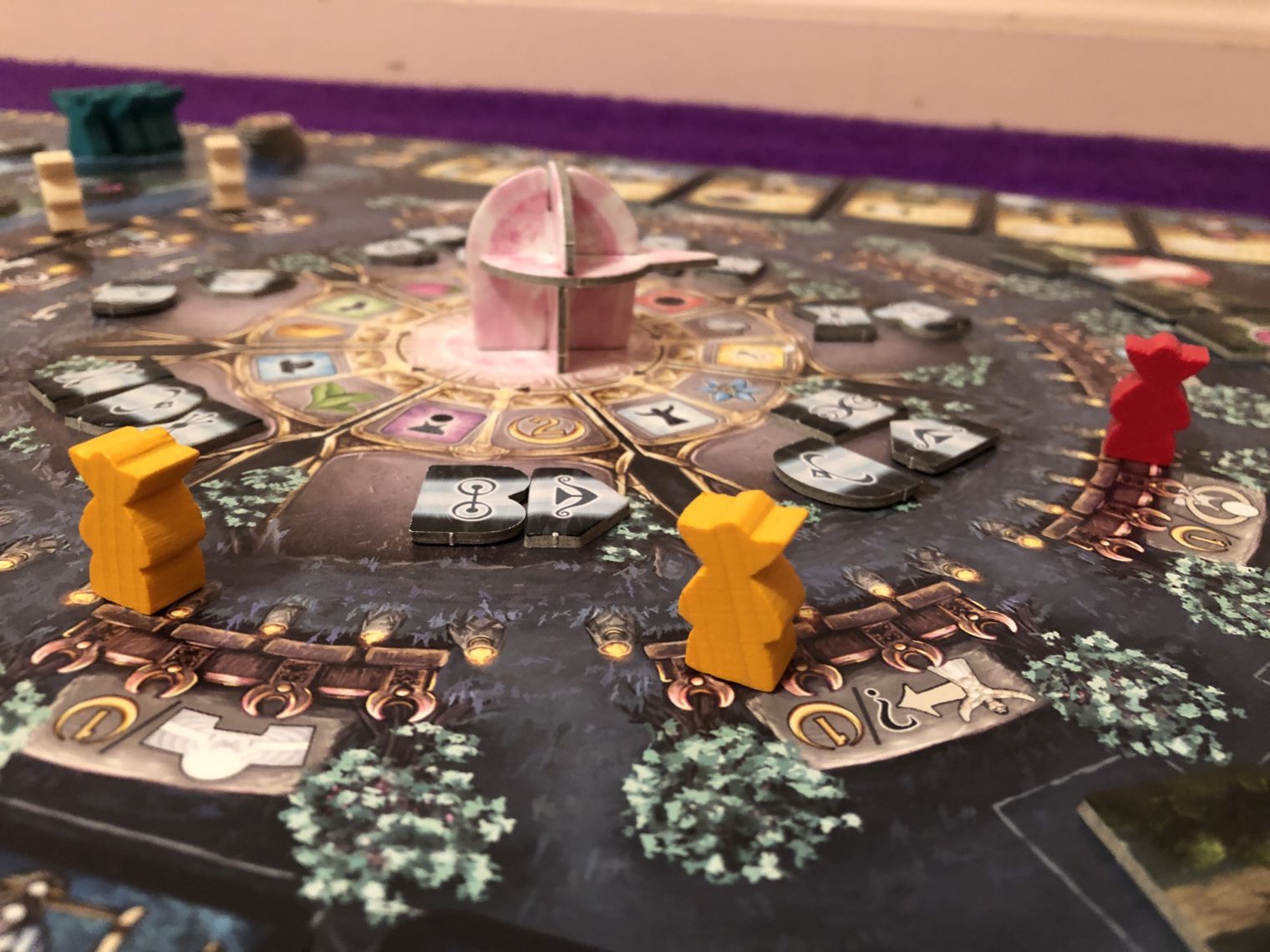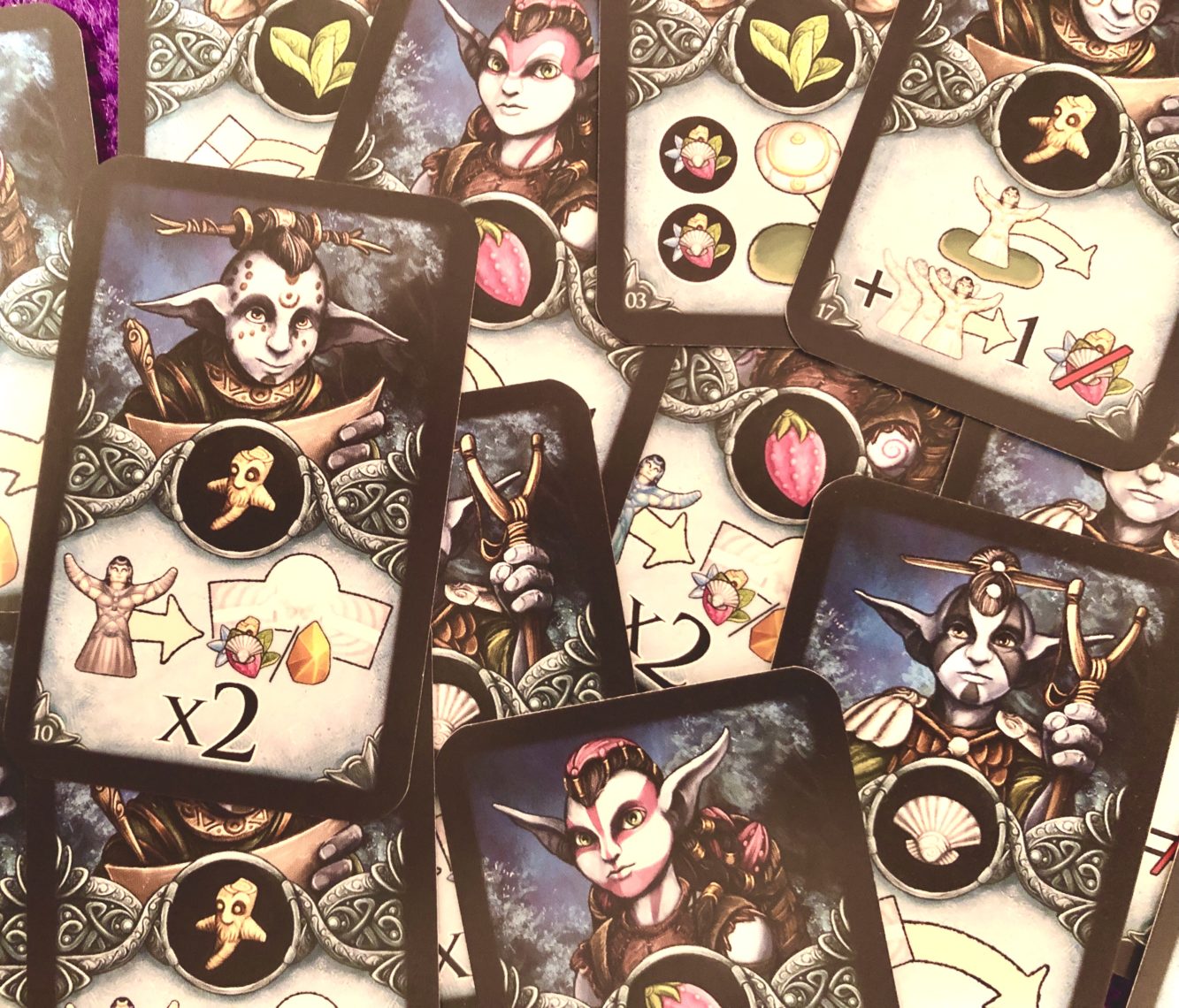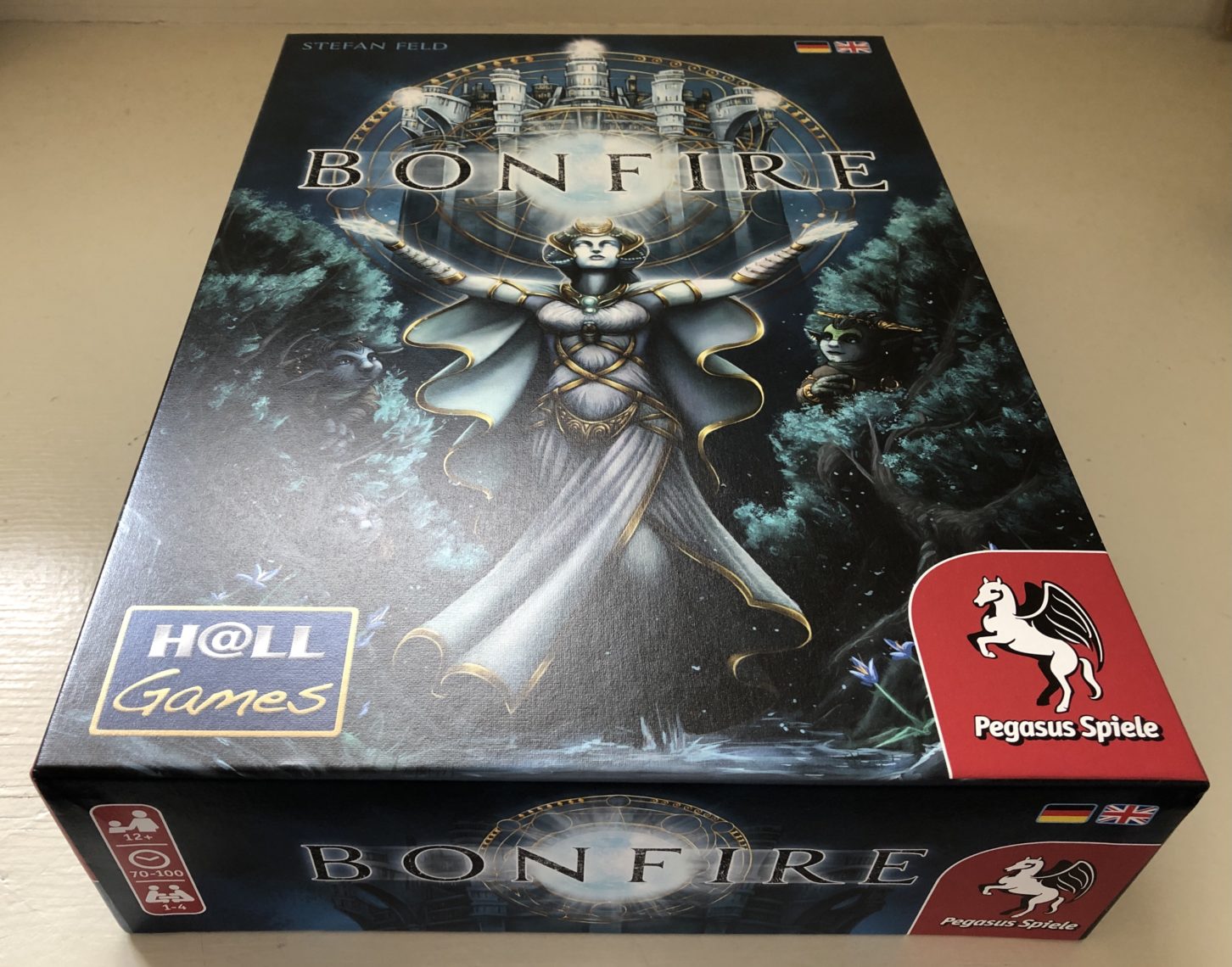Bonfire is the latest completely new Stefan Feld game and his second release of 2020 (Castles of Tuscany was the other one, which I wrote about back in November). For some reason Bonfire was slower to make it over the pond and I was only able to get my hands on it recently.
In Bonfire you and up to three others (there is a solo mode) are competing to score the most points by lighting bonfires (with bonus points for those with matching portals and/or path tiles), leading your Guardians to said bonfires, recruiting gnomes, fulfilling tasks, and having leftover bits and bobs.
The game plays over an uncertain number of rounds; the “final countdown” is triggered once a specific number of seats (scaled by player number) are filled on the High Council. At the end of the round when that happens everyone gets five more turns and then points are toted up.
On your turn you must do one of the following: place one of your remaining Fate tiles on your personal board to earn more actions tiles; spend some of those action tiles to do things; or light a bonfire and send one of your dudes to the High Council for a bonus and probably a healthy pension. The other way to get to the High Council is to fulfill one of the “Common Tasks” which are actually bloody hard and not common at all.

Bonfire’s playtesting name was apparently Streifenmanager (“strip manager”) which makes more sense when you learn that placing fate tiles is a puzzly mini-game where each 1 x 3 tile (ie “strip”) has three different actions on it. You always get one action tile of each of those, but if you can place the strips such that you form contiguous areas of the same action you get one for each adjoining one, too. Plus there are some spots you can cover on your board which give you a wild resource or wild action tile. Plus you always have two choices about which tile to add to your board so more decisions there.
The actions themselves let you move your boat around the magical archipelago, which is important because that’s how you get tasks which eventually turn into bonfires and Guardians (that you parade around your board for bonus resources and eventually VP’s). Other actions get you resources, recruit gnome specialists into your city (giving you special powers or endgame VPs), or draft a path tile to place around your board which will pay off when you parade those Guardians.

Bonfire’s solo mode against “Tom” (short for AuTOMata apparently) is well-thought-out and challenging, with an AI deck that basically takes things off the board so you can’t have them and scores points for Tom accordingly. You can choose to play “campaign-style” where you start out with a 10-point advantage in your first game against Tom but every game you win increases Tom’s starting advantage.
Overall I would say Bonfire is more or less a typical Feldian affair–a medium-to-heavy low-interaction game with many moving parts that fit together very well with many different ways to score points. Feld fans will not be disappointed, but its learning-curve makes it ill-suited to newer gamers.
Thus endeth the standard part of the review. What follows is self-indulgent maundering. Don’t say you weren’t warned.
* * *
On one of my Facebook boardgame groups someone posted a picture of their playthrough of Bonfire with accompanying commentary:
“He has really outdone himself. This is an action selection and resource management game, but he has left the doors wide open on this one. Several clever mechanisms allow you to get extra actions and everything is a victory point condition if you pick the right tiles. I am ready to play again!”
Let me ask you: would you be able to figure out what game this person was talking about without the picture? And what does that say about Feld’s designs?
Now, I dislike critics who dump on games (or movies, or music, or books, etc etc) that fail to be the kind of game (book/movie…) they (the critic) want them to be. For instance, here’s a review of Nomadland that takes a flamethrower to it because it isn’t a biting economic/social critique. It’s an unfair critique, imho, because Nomadland wasn’t trying to be that kind of movie–and judging it by those standards misses the point (starting with the fact that the novel it’s based on wasn’t written by Naomi Klein).
I think I’ve demonstrated in the opening section that I recognize that Bonfire is a successful design by contemporary standards. So when I now say that I also found Bonfire to be a rather empty exercise with no particular point, I know that this reflects much more about my current state of mind than anything related to what Stefan Feld set out to do.
It’s hard to disentangle how much of my feeling is pandemic-related and how much is due to my evolving taste in games. I honestly don’t know how some content creators out there seem to be able to radiate the same level of enthusiasm as usual. Maybe they’re just really good at faking it. Maybe they’re more grounded spiritually or have better support networks. Maybe they’ve been able to bubble with other gamers and thus have been able to maintain some semblance of “normal” gaming interaction.
Whatever the reasons, my own emotional/mental fatigue has made it harder to find the joy in things in general, and there are a lot of things I just don’t have the same patience to deal with as I did pre-COVID.
One of those things, as someone living on the far spiral arm of the tabletop galaxy, is spending time with games which are at heart about nothing more than creating the best VP engine. Sure at a micro level they might have original ideas, but ultimately don’t we have enough games already about turning cubes of one colour (however they are disguised) into cubes of another colour and ultimately turning those cubes into Victory Points? How many more games like that do we need?
In terms of the FOME framework Bonfire is Fun (for those who enjoy optimizing and puzzling) and it’s Original (in the mix of mechanics, especially the “strip management” for actions). It’s got the “FO” locked down.
But in terms of the “ME” (Mindfulness and Enlightenment) there’s no “there” there (as Dorothy Parker once said in regards to Hollywood). I mean, we all know that with rare exceptions Feld games could have any theme whatsoever. The major exception is Oracle of Delphi, which is why it remains my favorite Feld game.
In Bonfire the theme is druidic with its Guardians, Gnomes, and Council of Elders, but it could easily have been set in the contemporary US with states instead of islands, signs instead of bonfires, and factories instead of fate tiles. I will give Pegasus-spiele, the publishers credit though: they did commission a 13-page short story called “The World of Bonfire” to establish a backstory for the game, which shows that somebody at Pegasus though that it was worth paying someone to create some sort of underlying lore that would motivate players.
* * *

Unquestionably Stefan Feld is one of the most skilled modern tabletop designers working today working with the alchemy of boardgame mechanics. In terms of going beyond that, though, his work pales in comparison to the variety and ambition of contemporaries such as Lang, Pfister, or Chvaatil. Aside from one-offs like Oracle of Delphi or The Revolution of 1828 his themes are generic afterthoughts. Theme isn’t as important if the game is simple and elegant (Azul, No Thanks). But if I’m going to spend 2+ hours wracking my brains now it’s not enough any more for me to be motivated simply by wanting to win. I’ve got enough games that scratch that itch.
Fundamentally Bonfire is fine, perfectly fine. But I own several Feld games already and Bonfire doesn’t knock any of them off my shelf. It literally brings nothing new to the table. So when I do my Great Purge after all this is over Bonfire will be on the stack of games I get rid of because I. simply. don’t. need. it.
[…] do Kickstarter previews (except for very special games) and we don’t do puff pieces–I sent them my Bonfire review so they’d see that not even the great Stefan Feld gets a free […]